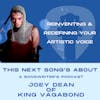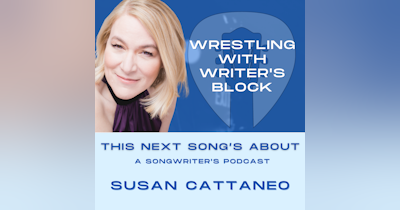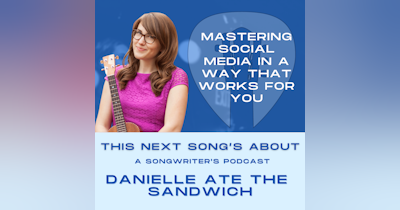Reinventing & Redefining Your Artistic Voice ft Joey Dean aka King Vagabond
===
Joey Dean: [00:00:00] The success metric in this industry, that is the most important is consistency. When you are feeling like you're not authentically speaking, like there is a bit of a show like you're pretending instead of simply being it breeds inconsistency and your audience is smarter than you think they will feel that.
And they will know that and it will inhibit growth.
Stevie Manns: Welcome to this next song. A podcast helping songwriters and musicians level up their craft for industry success. I'm your host, Stevie Manns. And I moved from Scotland to New York to pursue my musical and creative career. I spent a lot of time in studios, gigging in New York, and now I want to help you develop and hone your craft with this podcast.
I hope to leave you feeling inspired with some new tools at your disposal to help you move your own career. Now this episode is a little different to any of the previous hundred or so episodes, you may [00:01:00] have listened to already on this podcast today, I'm changing the format and I will be telling you the story of Joey Dean, AKA king vagabond, who has reinvented himself as an artist into a new persona.
Have you ever wanted to reinvent your artist self as a persona?
Perhaps you've envisioned yourself as the next SIA or Ziggy Stardust. Even Paul McCartney had a brief stint as Percy Thrillington. Seriously. It was a real thing, you can Google it. In the musical zeitgeist, there have been so many artists who have embodied a persona, whether permanently or as part of exploring their own artist journey.
I recently spoke with an artist who has done just that...
Joey Dean is a New York based singer- songwriter and front man of alternative pop duo, King Vagabond. Joey [00:02:00] spent the last eight years recording and touring in a four-piece band called Pros and Icons going on national tours and opening for such artists as Shawn Mendez, Meghan Trainor, Todrick Hall, and more.
For his new project King Vagabond, we see Joey step into this new persona, complete with costume and drag artistry to bring his character to life, both musically and on stage.
Joey Dean: I think that I'm always on that borderline of Alt and pop, but Pros and Icons previously was more pop leaning than the music that I've created for King Vagabond.
I guess the simple word to explain the transition musically was permission and allowance and alignment
Stevie Manns: As with so many musicians and artists. The pandemic [00:03:00] provided an opportunity for reset and a review of where Joey was musically with his band and he had time to consider what he wanted to do next.
Joey Dean: It was at the very beginning of the pandemic that things started to disintegrate in my music career at a point where they were presumably at their peak. In 2018, we had done Vans Warped Tour, which was the biggest feat we had experienced and then we went on to national tours in 2019. So it was a year plus of really amazing things happening we had throughout the year, a song on the radio things that I've wanted my entire life to happen.
Then at the tail end of 2019, we were a four piece band.
Band Members: I'm Lenny, Jay, I play guitar. I'm Joey Dean and I am on vocals. I'm Tylo and I play bass. And I'm Nico, I play guitar.
Joey Dean: And one of the members decided to move to Los Angeles, which then created an inherent identity shift because when you go from four members to three, there is naturally going to be some missing puzzle piece that was previously [00:04:00] there.
It was that two year span of silence. I was asking myself, what do I want? What is the point of all of this? I felt for so many years, I was in the space of compromise and not collaboration. Niko and I were the more expressive artsy-fartsy weirdos of the group. We always felt left of center and mis-fitted, and we really wanted to challenge the way people perceived us and art and life in general. And so thinking about what I wanted to gain from my future, the music that we were writing began entering the space of fairytales. Another word would be cautionary tales and how they were these stories of how we connect with people.
Stevie Manns: Joey was also beginning to consider how he could use his music and experience as an artist to help others who are trying to find their footing in the industry just like he did.
Joey Dean: I decided to fully, crank the volume on my subconscious and everything that I wanted [00:05:00] to create and see, I decided to shed inhibition and get rid of that compromised feeling and move into a space of collaboration. But ultimately my artistic vision, not me bending to the will of the industry, not me bending to the will of other people and what they want, but really looking at myself in a mirror and saying, what do you have to say with this very specific life experience that you've lived? Especially now that you're going through this moment in a pandemic where everyone is taking a step back and thinking and observing and reflecting, how can I use that and make something really beautiful out of it? That is what instructed this amped up volume up all the way, aesthetic and presentation, and I guess, mission.
Stevie Manns: One thing that may surprise you when you look at Joey, when he's in all of his glory as a performer as King Vagabond in drag and even before is the lead singer of Pros and Icons, is that he struggled with the fear of performing. To my eye, Joey's a seasoned performer. He's comfortable in front of the [00:06:00] camera and an audience, and he's really clear about his artistic vision, but that wasn't always the case.
Joey Dean: I joked that I came out of the closet when I was 14. And I came out of the closet as a singer when I was 21. So there is this deep rooted fear of me being an artist. And I don't know if it was this gateway into vulnerability, but I was really, truly terrified to perform. And I forced myself to do it. And shortly after met the founding members of Pros and Icons and I was just so green and so new to it, I didn't know, what to do. All of it was instinct. I took that instinct and I put it on the back burner because I thought that I was listening to people who knew better than me while also navigating my identity and that kind of weird space of being vulnerable as an artist and King Vagabond is the by-product of that. That is pure vulnerability. It's pure allowance and permission. It's definitely dialled up. And then there is an intentional presentation to it, but it is [00:07:00] me, being displayed outwardly. I always thought that my subconscious and the art that I leaned toward and things that I created were bizarre to people. I don't know why I told myself for a lot of my life I wasn't permitted to do that. And I was working with people who didn't want to explore that level of artistry or had a different vision for themselves. So I kept a lot of myself hidden and there isn't anyone to blame, but really me, I just didn't let myself do it, but it was a lot of different barriers that I had to work through to create even one song
Stevie Manns: Joey's queerness became something he had to deal with as the lead singer of his band.
Joey Dean: I was navigating that space as somebody who didn't know if I would even be liked if I did that. I was the only gay person I was working with. So I was working with people who didn't necessarily relate to my identity and because I didn't want to come across like a dictator, I gave, I think too much space to other people who weren't writing the words to [00:08:00] the music and singing the songs and speaking on stage.
And so I created this presence that was an identity that wasn't mine almost. It was me, but it was just like such a diluted and compromised version of myself. I began this bit saying that queer people are comfortable with not being in the spotlight. It definitely wasn't anything that was ever openly said by any of my band mates, no one ever told me not to be open with myself, but it was just the state of the industry at the time and not really feeling 100% comfortable with being open about that in that there is so much negativity when you're an artist and you're putting music out into the world and having tens of thousands of views on a YouTube video and opening yourself up to that level of ridicule early on, I wasn't super comfortable with that.
Me now, I don't care. Let me have it. But back then, it was a very weird space for me to navigate. And I definitely limited myself and I hindered myself. I don't want to paint anyone out to have been some narcissistic dictator, but in regard to my queerness, no one has ever telling me to not be [00:09:00] open about it.
I think it was just the way that I navigated the space naturally. And it came from a fear-based and an apprehensive based place. And like I said, it was really challenging for me to even get on a stage and perform, and then to add the layers of being myself openly and transparently.
Stevie Manns: Joey's alter-ego King Vagabond is deliberately styled as a persona, but one thing that is clear is that we're looking at something of a misunderstood queer Disney villain type of character.
Joey Dean: The villains are always the people that are the ones that are cool. Queer people I think we're always at an always are and always have been at the cusp of artistic innovation. And I think villains express that you can always view a villain's story from the alternative perspective.
There is a relatability to the misfits and all these villain, tropes, I think queer people growing up, see themselves more deeply in those alternative narratives. And for me, the deep rooted inspiration of king back bond during that two year stillness, [00:10:00] I was really working through what I wanted to do with my life.
And I love writing. I have a degree in literature and it's inspired so much of what I've done artistically, but I never was able to really add that to the music. But as an artist, as an identity, as a creator, I feel like this is the first time I'm truly looking at my nucleus. And I'm drawing energy from it.
And I'm exerting that into the three-dimensional space that I like to create for art, because it's not just about the song to me. It's about the aesthetic. It's about the music videos. It's about everything and that's what I like art. And I just feel like I'm able to finally tap into that.
Stevie Manns: Joey also happens to be in English literature major. And he goes on to describe the really detailed image and vision that he had for King Vagabond. King Vagabond was a character born out of his imagination. That was originally an idea for a novel he wanted to write.
Joey Dean: I pictured this [00:11:00] post-apocalyptic burnt down forest of a desolated community of people.
And these monsters be attacking these people, these representations of the muck and grime of the society and the by-product of how we've neglected the human qualities and earth qualities of the world. But I pictured this really dionycean and beautifully and mythological flowing figure, embodied death, but life simultaneously walking through this forest and grass and sprouting, wherever he steps and vines extending from his blood vessels and entering the villain's body and killing them. This novel idea was really rooted in the collective consciousness and teaching people how to tap into what we've in a post-apocalyptic society, what we've been disconnected from. I think it was a direct response to what I was witnessing in the world during the past two years and how people are just increasingly becoming more and more divided.
And I'm just such a believer that I know it sounds silly, but I am genuinely believer of, I love thy neighbor [00:12:00] and have empathy for your enemy. And I know it's really challenging for a lot of people, but I do think that there is a solution there to some degree. And so I wanted to create art that had that message embedded within it.
Stevie Manns: It turns out that the first single for king vagabond is not only the first. But it's the first piece of the puzzle into this fantasy world
of his character.
Joey Dean: Rule the World is the premiere single it's the first kind of chapter into the world of vagabond. And it does do justice, but there is more to unfold.
So the story will make sense, like any good story. The writer thinks about the ending before writing the first chapter and that's where I'm at.
Stevie Manns: And lastly, I asked Joey what advice he would give to someone who's considering their own artist reinvention. Maybe you're sitting at home, listening to this episode, and you're worried about the fan base that you've taken years to build up. And you think they might not follow you on your new journey?
Joey Dean: It's a major trope and how I perceive music marketing at [00:13:00] large, but the success metric in this industry that is, I think most important is consistency. And that is in many different facets. Not only consistency. For people on the internet and showing up for people in your music and showing up in yourself, but consistency and voice and what you're speaking on.
And when you are feeling like you're not authentically speaking, like there is a bit of a show, like you're pretending instead of simply being it breeds and consistency and your audience is smarter than you think they will feel that. And they will know that and it will inhibit growth. I had so many amazing opportunities in my career. Huge huge stages. I couldn't even count the thousands, the tens of thousands, maybe more that I've performed in front of, and my years in Pros and Icons, but we always [00:14:00] heard we were good. People liked our music, but there was this inconsistency and I realized it was me because I was the face, the bands, and so much of what we were talking about, wasn't from me. And it didn't feel right when I was doing. I felt like I was pretending, I felt like I was back in the closet. I felt like I was in a room, a straight guy isn't I needed to hide my identity because I was going to get beat up. If I spoke to "femmy", a lot of that was in my head. I just think it's in everyone's best interest.
If you are an artist right now, and you're fearing so much, the idea that you might lose everything. If you lean into yourself really hard. Chances are, you're probably not going to get very far doing what you're doing now. And even if you do get far, you might lose it anyway, because eventually you're going to break and you're going to feel like you're living a lie.
It is so much more valuable to, as soon as you [00:15:00] can just look yourself in the mirror and say, I love you. I'm happy to show you to the world. And I want to connect with people just like you. And that's what happens when you're authentic. You meet people who are other versions of yourself. And a lot of the times it's younger people who want and need the help that you can provide them with the wisdom that you've gathered.
And that's a big direction I'm taking king back one to, with kind of allowance and permission.
Stevie Manns: Joey has kindly allowed me to play us out today with King Vagabond's new single Rule The World. So stick around for that in just a moment. If you want to hear the full unedited conversation with joey as King Vagabond and myself, you can join the Patreon where all of these conversations are available un edited and as video, just go to patreon.com/thisnextsongsabout
You can follow Joey as King Vagabond @KingVagabond and on Spotify for all new releases and to watch his [00:16:00] queer villain anti-hero story unfold. The next single one night comes out May 6th. I sincerely hope you enjoyed this episode on the new format. If you do want to hear a similar episode in conversation last season, I spoke with LA based musician and singer songwriter Esabalu. about how and why she decided to release music under a new moniker. I'm Stevie mans. Thanks for listening. I give you King Vagabond with Rule The world.



